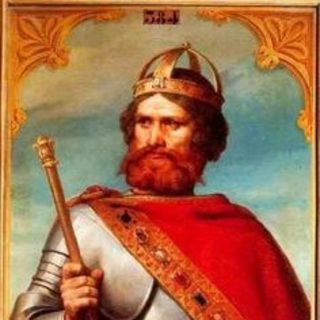Frederick Barbarossa was a brilliant but overly proud knight and ruler. Both when galloping on the bloody battlefield directing his men and when seated on the imperial throne performing his office as Holy Roman Emperor, Frederick Barbarossa, whose surname derived from his red beard, left a significant mark on twelfth century Europe. He was one of history’s greatest generals. While his strong hand kept anti-Catholicism in check, he determined more than once to impose his will beyond his authority. Sometimes he fulfilled his duties as Holy Roman Emperor regrettably and only after opposing the pope. As a knight and emperor, Frederick’s stances were sometimes embarrassingly inappropriate.
Frederick Barbarossa was a gifted knight. In battle after battle, Frederick showed an impressive ability to easily vanquish his opponents. Throughout his numerous campaigns, he so swiftly subdued opposing armies that the enemy soon dreaded him. Even in his old age, he maintained this militant outlook. He promised to lead a crusade, and by fulfilling that pledge in 1189, he showed himself to be one who would not shy away from duty unlike his later successor, Frederick II, who only pretended several times to fulfill his crusading vow. Frederick Barbarossa also had virtuous principles, which he followed dutifully. Contrary to engaging in the usual bloody practice of raiding lands crossed, he asked permission from the Byzantine emperor to pass through his territory. “Grace and friendship deliver a man: keep these for thyself, lest thou fall under reproach” (Douay-Rheims, Proverbs 25.10). Even when he was treacherously betrayed by Isaac II, who asked Saladin to drive out Frederick, he kept his backlash to a minimum, focused upon the liberation of the Holy Land. While acting chivalrously in this manner, Frederick also displayed the militant side of knighthood on his way to the Holy Land, deftly annihilating those Muslim armies that came to slow him down. Frederick Barbarossa proved to be both a chivalrous and militarily capable knight.
Despite starting numerous disputes with the papacy, Frederick Barbarossa eventually fulfilled his duties as Holy Roman Emperor. Innumerable times he clashed with the current pope over matters of land in Italy, the pope constantly condemning Frederick for his raiding of Lombardy. The pope also was not afraid to relieve his vassals of their oath of allegiance to him when he was particularly stubborn. However, Frederick Barbarossa always guaranteed Church rights within his domain, marching on those who were harsh or oppressive towards the Church. “…he was absorbed in the problems of Germany, particularly the long-drawn-out feudal punishment of his mightiest subject, Henry the Lion, Duke of Bavaria and Saxony, who was charged with having ‘sorely oppressed the liberty of the Church and of the princes of the Empire by seizing their possessions and by threatening their rights’” (Carroll 114). He also, coinciding with the idea of the Holy Roman Emperor being the protector of the Church, became the only such emperor to lead a crusade against Islam in the Holy Land. Sadly, while crossing through the difficult Taurus Mountains into Cilicia, Frederick somehow fell into a river and, likely attired in heavy chainmail, drowned. Had this tragedy not happened, Jerusalem would almost certainly have been taken and placed under Christian guardianship once more.
Frederick Barbarossa sometimes represented the worst qualities of knighthood. He constantly infringed upon the rights of neighboring territories, invading them and razing their cities to the ground. Indeed, he did not stop there. Marching all the way to Rome, Frederick proceeded with an attempt to sack the city. Shamefully, he tried to burn the oratory of Santa Maria, whose defenders were forced to surrender for the sake of the church, lest it go up in flames. Then, violating the solemn pact between the Holy Roman Emperor and the pope, Frederick attempted to replace Gregory VII with his own, personal “pope,” Octavian of Crema. “I have almost been in all evil, in the midst of the church and of the congregation” (Proverbs 5.14). While he finally was forced to leave Rome, he still tried to maintain hold of his gains in northern Italy. Upon Octavian’s death, he supported the election of a successor antipope, John of Struma. Although no other antipopes were chosen after John of Struma, their presence obviously greatly divided the Church, which turned into a confused mess. Frederick Barbarossa caused much turmoil and strife inside Christendom, of which he was purportedly the greatest supporter.
On the battlefield, Frederick Barbarossa proved to be one of the greatest generals in history, fighting like a lion amongst men. In his holy office, Frederick ultimately performed the duties required of him, being a strong, priority-guided man. But amidst this great competence, Frederick Barbarossa’s selfish conquests caused much chaos within Christendom. While his independent mind and commands caused problems for the Church, perhaps his confident strength was crucial for the Church. Without his lusty, devoted hand to protect Christendom before his rule, the Muslims had made colossal advances into Christian territories and indeed were on the verge of a large-scale European invasion. With Frederick ensuring peace temporally, strong popes could work towards a moral serenity. Only one explanation can account for Frederick Barbarossa’s extraordinarily crucial historical role: divine intervention.
Works Cited
Carroll, Warren H. The Glory of Christendom. Front Royal, VA, 1993. Print.
Holy Bible: Douay-Rheims Version. Charlotte: Saint Benedict, 2009. Print.
1
You must be logged in to post a comment.